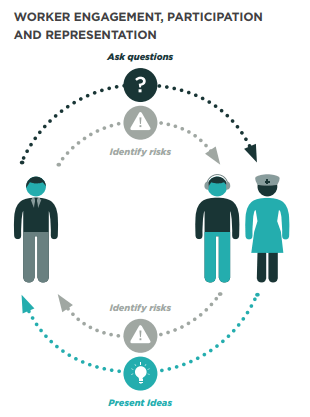
The Health and Safety at Work Act 2015 (HSWA) strengthened obligations on employers in relation to worker participation by introducing twin duties:
1. To engage with workers about health and safety – employers talking to workers
2. To have participation practices in place – a way for workers to talk to the employer.

Workers must be involved when deciding how worker participation will operate within the company, and there is a regulation outlining processes which can be followed. The practices used can basically be whatever system the workers want, as the emphasis is on coming up with a system and processes which best meet the wishes and needs of workers.
A Worker Agreement can be developed between the employer and workers outlining how they have together decided to engage with workers to ensure their participation in health and safety. This allows for flexibility with different types of companies, doing different types of work.
There must be evidence that workers have:
had an opportunity to have a say in what the processes are
agreed to any agreement that is made
an opportunity to review, and if needed, update the Worker Agreement annually.
If the workers are not interested in being involved, the employer must show that they have taken reasonable steps to encourage involvement and have attempted to rectify any roadblocks.
Workers may or may not decide to have Health and Safety Representatives (HSR) and a Health and Safety Committee. They may also decide to adopt the requirements of the HSWA (Worker Engagement, Participation and Representation) Regulations 2016 or not. This applies to issues such as training for worker representatives, and the agreement may state that the approved course will be used or outline alternative training.
I am concerned that many companies believe, based on information provided by WorkSafe and training providers, that they must use HSR training based on the Unit Standard 29315 without understanding all the options.
Don’t misunderstand, if Health and Safety Representatives wish to use the functions and powers available to HSR’s under HSWA, such as Provisional Improvement Notices (PINs) or cease unsafe work, then they must be trained (initially to Unit Standard 29315).
In practical terms I believe there are few examples of HSR issuing Provisional Improvement Notices (PINs) or telling workers to cease unsafe work, I question whether these are useful tools.
HSRs do need training, however what this will be and how it will be undertaken can be decided as part of the Worker Agreement. This is likely to include the rights and responsibilities as an HSR and cover issues such as Risk Management and Incident Investigation.
I believe, that the process of developing a Worker Agreement provides an opportunity to come up with a system which reflects the company culture and gains support from workers.
For further information and advice contact info@avidplus.co.nz or visit our online shop at www.avidplus.co.nz/avidonline.

